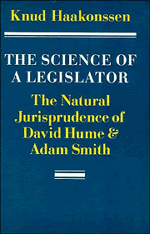Book contents
- Frontmatter
- Contents
- Acknowledgements
- List of abbreviations
- Chapter 1 Introduction
- Chapter 2 Hume's theory of justice
- Chapter 3 Smith's moral theory
- Chapter 4 Smith's theory of justice and politics
- Chapter 5 Smith's analytical jurisprudence
- Chapter 6 Smith's critical jurisprudence
- Chapter 7 Smith's historical jurisprudence
- Chapter 8 Natural jurisprudence in the face of history
- Notes
- Bibliography
- Index
Chapter 3 - Smith's moral theory
Published online by Cambridge University Press: 04 April 2011
- Frontmatter
- Contents
- Acknowledgements
- List of abbreviations
- Chapter 1 Introduction
- Chapter 2 Hume's theory of justice
- Chapter 3 Smith's moral theory
- Chapter 4 Smith's theory of justice and politics
- Chapter 5 Smith's analytical jurisprudence
- Chapter 6 Smith's critical jurisprudence
- Chapter 7 Smith's historical jurisprudence
- Chapter 8 Natural jurisprudence in the face of history
- Notes
- Bibliography
- Index
Summary
Hume and Smith on sympathy
Turning from Hume's major philosophical work, the Treatise, to that of Smith, The Theory of Moral Sentiments, is a somewhat confusing experience. On the one hand there are all the similarities in the problems dealt with and the theories proposed, in the criticisms and alignments of predecessors, and there are the recurring, more or less clear references to Hume himself. On the other hand there is a significant change in the tone and style of the discourse. While one could say that Hume is constructing an abstract theory with its own language, and trying to accommodate common experiences and their linguistic expressions within it, Smith is trying to accommodate an abstract theory within the conceptual framework of ordinary language – or at least with a minimal stretching of it. And this is presumably one of the reasons why Hume scholars find it difficult to see much profundity in Smith, and why Smith scholars may tend to think that Hume's profundity was bought at the cost of empirical content and relevance. Nor is the difference confined to language and style. For it is precisely Smith's complaint against Hume that his theory of morals was a philosopher's construction which did not catch human morality as it is – a complaint which we shall have occasion for returning to in the present chapter.
- Type
- Chapter
- Information
- The Science of a LegislatorThe Natural Jurisprudence of David Hume and Adam Smith, pp. 45 - 82Publisher: Cambridge University PressPrint publication year: 1981

